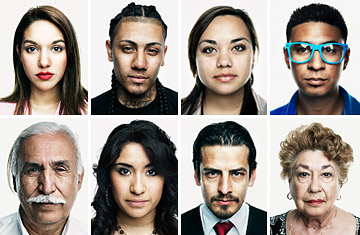
(2 of 6)
Aides to Barack Obama, who had been watching the Valenzuela race closely, quickly dispatched Katherine Archuleta, a Latina voting activist from Colorado who now serves as Obama's political director, to win Valenzuela over. They didn't want only his support; they also wanted his network and his blueprint for changing the politics of this reliably Republican state and others like it. Their premise: demography is political destiny. For the better part of two decades, social scientists have been predicting that a Latino population boom would one day transform national politics. Latinos now account for more than half of U.S. population growth and one in four American newborns. They make up about 16% of the country today and will account for 30% by 2050. But Obama's aides care little about the out-year projections. They believe that Latino votes could be decisive in 2012, and they have been quietly building a national strategy to make that happen. Arizona, of all places, is the testing ground.
The battle lines were drawn decades ago. In every presidential contest since 1992, Republicans have won, at minimum, about a quarter of the Latino vote, and Democrats have won at least half. Up for grabs in most years is the remaining 25%. If Obama gets the vast majority of it in November, that could put him over the top in closely fought Colorado, Nevada, Florida and Arizona, potentially delivering an electoral-college victory even if he loses Indiana, Wisconsin and Ohio. Republicans by contrast, seem to have done everything in their power to alienate these voters, concentrating instead on wooing the more anti-immigration wing of their party. Herman Cain excited crowds with jokes about electrifying a fence on the Mexican border and guarding it with alligators. Michele Bachmann signed a "double fence" pledge. Mitt Romney scored points by opposing in-state tuition breaks for undocumented students and advocating "self-deportation" for those 11 million people currently living in the country illegally. In early-voting states like South Carolina, where nativist sentiment runs high in the GOP base, tough talk was the easiest political move. As the campaign continues, the Republican candidates hope to appeal to Latinos on bread-and-butter economic issues. The question is whether it's already too late.
The White House, meanwhile, having stumbled with Latinos during Obama's first two years in office, swiveled back to immigration policy late last year. Under pressure from Hispanic leaders, it suddenly slowed its push for deportations and amped up the constituent service, making certain, for instance, that Valenzuela got to meet Obama on his latest visit to Arizona, the sixth in three years. "If we do our grassroots stuff right on the ground in all these Western states, which we will, because it's something we are good at," says Obama's campaign manager Jim Messina, "we could seriously change the outcome."
How the West Was Lost
